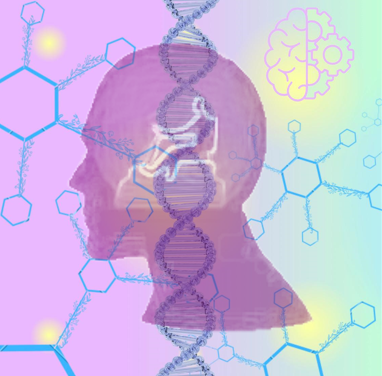Strategizing from 7 cities across the globe
Brain RNA: DNA Hybrids: An Ode Against Free Will
In the labyrinth of human existence, where the mind weaves its intricate tapestry of emotions, behaviors, and thoughts, a profound paradox emerges. Are we, as Charles Baudelaire might suggest, forgetful creatures, oblivious to the origins of our essence? Or are we, as Albert Camus muses, Sisyphean figures, condemned to endlessly reconcile the absurdity of life with our desperate need for meaning?
ACADEMICPSYCHIATRYBIOLOGYGENETICS
Caila Worley
12/30/20244 min read


In the labyrinth of human existence, where the mind weaves its intricate tapestry of emotions, behaviors, and thoughts, a profound paradox emerges. Are we, as Charles Baudelaire might suggest, forgetful creatures, oblivious to the origins of our essence? Or are we, as Albert Camus muses, Sisyphean figures, condemned to endlessly reconcile the absurdity of life with our desperate need for meaning? At the intersection of these existential queries lies a burgeoning field of neuroscience that seeks not only to unravel the mysteries of mental illness, but also to offer an ode against the illusion of free will.
A recent discovery in molecular neuroscience led by Rose Marie Akiki, an MD/PhD student at the Medical University of South Carolina (MUSC), Dr. Makoto Taniguchi, an assistant professor in the department of neuroscience at MUSC, and Dr. Christopher Cowan, professor and chair of the department of neuroscience at MUSC, describes the role of genetic modifications in emotional experience-induced behavioral adaptation. This study challenges the very notion of autonomy in human behavior.
Their research reveals that a conserved genetic element in our DNA leads to the production of an enhancer RNA (Npas4eRNA), that forms an RNA:DNA hybrid (R-loop) by sticking to its complementary DNA, and facilitates chromatin looping to drive the rapid induction of immediate-early genes (IEGs) like Npas4 in the brain. These genes, in turn, orchestrate the neural response required for both adaptive and maladaptive behaviors consequent to emotional experiences.
Consider this: when subjected to chronic stress or addictive substances, the brain’s ability to adapt hinges on molecular processes occurring in specific brain areas such as the medial prefrontal cortex or nucleus accumbens. The dance of transcriptional regulators, the formation of DNA loops, and the precise orchestration of gene expression are not acts of free will, but the deterministic choreography of biology. As Camus reflects, "There is no fate that cannot be surmounted by scorn," yet this defiance itself is grounded in neural circuits shaped by molecular inevitabilities encoded by our DNA.
Mental illnesses, from depression to schizophrenia, often arise when these finely tuned molecular mechanisms falter. In the 13 December 2024 issue of Science, Akiki et. al. show that the dysregulation of eRNAs and R-loops can lead to maladaptive plasticity, where behaviors meant to aid survival become pathological. The paper’s insights into the Npas4eRNA mechanism provide a glimpse into the origins of such disorders. Emotional stimuli trigger the expression of genes, yet when this process is disrupted through chronic stress, genetic predisposition, or environmental insults, the result is a mind ensnared in maladaptive cycles of behavior.
"You need a change in the genetic basis of how everything is working, what is being transcribed, what is being formed in the cell to form stronger neural circuits that underlie behavior," said Akiki. She even hypothesized this function of the R-loops in the neural pathways because of her understanding of the immune system’s determinism when faced with a pathogen. She said in her interview with EurekAlert “I didn't think that evolution would favor a different mechanism for neurons, we found that neurons, like immune cells, can respond to a stimulus through the formation of an R-loop.”
This understanding offers a path forward, a possibility of "transforming mud into gold," as Baudelaire might say. By targeting these molecular disruptions, we can aspire to develop treatments that do not merely suppress symptoms but restore the brain’s natural adaptability. Akiki et. al. also designed and tested a CRISPR inspired construct that can specifically degrade R-loops to block maladaptive behavioral outputs such as drug seeking after continuous cocaine use or decreased motivation after chronic stress. Therapies designed to modulate R-loop formation or even enhancer-promoter interactions could recalibrate gene expression in affected brain regions, offering hope to those whose lives are derailed by psychiatric disorders. Dr. Taniguchi said that future directions will aim to “see how stable it is and how it gets disrupted in pathological conditions”.
As neuroscience marches toward these therapeutic frontiers, it confronts an unsettling truth: the essence of human behavior may be less a testament to free will and more a narrative of molecular determinism. The findings on Npas4eRNA highlight how our responses to the world—from the joy of a rewarding experience to the despair of chronic stress—are governed by mechanisms beyond conscious control. “By bringing the enhancer and promoter together in space and time, R-loops seem to be facilitating their interaction and driving the response to turn on a gene and behavioral adaptation”, Dr. Cowan said.
Baudelaire’s observation that "the greatest trick the devil ever pulled was convincing the world he didn’t exist" could be reimagined in this context. The “devil” is the illusion of free will, and neuroscience unveils it as a construct, a comforting fiction masking the deterministic reality of our biology.
But, even as we uncover the deterministic threads that bind our minds, we are taking control of our mind by seeking to fix what is broken. To cure a mental illness is not merely to restore balance to a dysregulated brain but to affirm the human desire for dignity and freedom, even in the face of determinism.
The molecular insights into Npas4eRNA and R-loops are more than scientific curiosities; they are beacons illuminating the path to a future where mental illnesses are no longer enigmatic afflictions but understood phenomena with tangible solutions. This knowledge could promote a shift in perspective, a recognition that human behavior is not wholly self-determined but emerges from the complex interplay of biology, genetics and environment. In acknowledging this, we may find instead of despair a profound sense of compassion. If maladaptive behaviors are not choices but consequences of molecular disruptions, then the stigma around mental illness should dissolve. We can approach treatment with the empathy that arises from understanding.
As Baudelaire and Camus might agree, the human condition is marked by its contradictions: the yearning for freedom in a deterministic world, the search for meaning in an indifferent universe. These current findings could be interpreted as an attempt to break free from the prison of the mind by transcending towards a future where psychiatric illnesses can be cured.
references
Rose Marie Akiki et al. A long noncoding eRNA forms R-loops to shape emotional experience–induced behavioral adaptation. Science 386,1282-1289(2024).DOI:10.1126/science.adp1562
Design by Lynn Fanous
